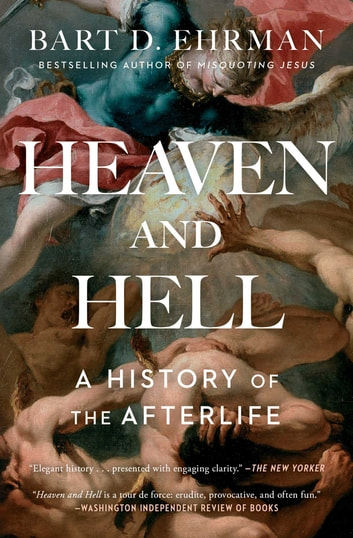4thace reviewed Heaven and Hell by Bart D. Ehrman
An unbiased account of theories of the afterlife
4 stars
In this book, it is not the author's intention to come up with a single correct formulation of what happens after death. He gives a summary of what the source documents state and lets the reader decide what to accept or reject. The one stance he takes is against uninformed preaching and writing which rely on misunderstandings of what the historical record contains. I believe he sees himself as one who applies methods used by historians to interpret primary sources to infer what people believed at the time they were recorded. He does not venture into doctrine or philosophy of religion.
There is no one place that sets forth what the afterlife will be like and what milestones, but only scattered bits through the various sources. All of this literature was developed long before the formulation of creeds and confessions which is what the majority of Christian churches now …
In this book, it is not the author's intention to come up with a single correct formulation of what happens after death. He gives a summary of what the source documents state and lets the reader decide what to accept or reject. The one stance he takes is against uninformed preaching and writing which rely on misunderstandings of what the historical record contains. I believe he sees himself as one who applies methods used by historians to interpret primary sources to infer what people believed at the time they were recorded. He does not venture into doctrine or philosophy of religion.
There is no one place that sets forth what the afterlife will be like and what milestones, but only scattered bits through the various sources. All of this literature was developed long before the formulation of creeds and confessions which is what the majority of Christian churches now use to decide who is an adherent and who is not.
We start out with a chapter discussing the development of thoughts during recorded history about what happens around death, at least in the Near East. There's a theme that runs through here which is puzzling out the relationship between an individual's body and soul : After death, does the body return to life in some form, or does only the soul persist, or are both lost?
Because Israel was part of the Greek-speaking world during the time of the New Testament we take a side excursion to see what the great philosophers of ancient Greece thought. In the last three-quarters of the book the author takes a look at all the passages in the Bible touching on the disposition of a human being at the point of death and afterwards, going back to the original Hebrew and and Greek. It's quite a stretch of time where you cannot say that the Judeo-Christian tradition decrees one picture only. There is a spectrum of ideas, ranging from blank nothingness at the time of death, to an afterlife where shades experience very little, to one where there may be specific places where the soul with or without the body is subjected to treatment that depends on how they conducted themselves during life. But the other big influence considered is a desire for accountability of the individual according to how faithful they were to their beliefs during life.
The portion where he talks about ideas during Jesus's time and afterwards is interesting because not only does he look at the New Testament we know about but also books not accepted as canonical. The main message was that there was no consensus on these matters among Christians. The Book of Revelation is the most well-known piece of apocalyptic writing but not the only one from this time. The others have strikingly different takes on what happens after death. The author takes the view takes the view that Jesus and other historical figures belonged to an apocalyptic community that foresaw an end of all things coming soon. As years passed and this did not happen, this started to become a crisis as they tried to account for what this meant for all the other beliefs.
I liked the way he presented it in a neutral, factual way without bias in a way that non-experts can understand. He has written many other books on religious studies which I would be interested to read in the future. I like having all of the material in an even-handed way so I can work out what my own belief is.

